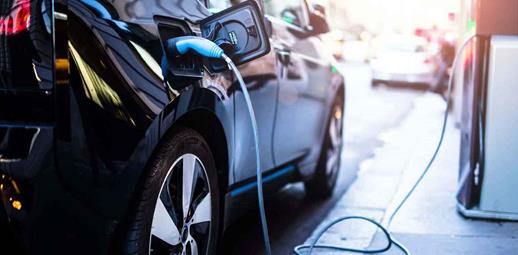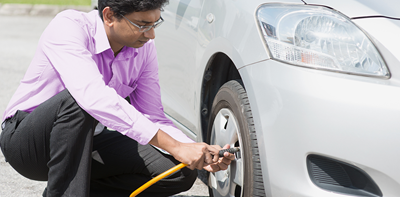
Just a few years ago, an electric car may have been a bit of a head-turner (if you could hear it). But nowadays, you’re unlikely to bat an eyelid if you see a Nissan Leaf or Tesla Model 3 cruise past quietly.
It’s inevitable that they are the cars of the future and are set to become more and more common, with the sale of new petrol and diesel vehicles due to be banned by 2030. Electric buses and lorries are likely to also become the norm.
However, despite their rising popularity, you may not have been inside an electric vehicle (EV) and the idea of buying one yourself might not seem like a viable option. But perhaps now is the time to start looking at it as a serious contender for your next purchase?
So, if you’re still fairly new to EVs, here’s what you need to know.
How electric cars work, in a nutshell
Electric vehicles use electricity stored in a battery to power a motor and turn the wheels.
We all know that petrol or diesel cars have batteries, but they’re only used to start the engine and power things like your lights and radio. In contrast, in an EV, the battery is used to power everything in the car.
An EV battery can be recharged by plugging them in – more on that below. They can also be charged when you drive; this happens when you press down on the brakes. It creates energy that can generate electricity, which is then sent back to the battery, making it self -sufficient to a degree, and pretty clever!
Since they work differently, electric cars don’t share all of the same features as petrol and diesel cars; for example, there’s no exhaust pipe, fuel tank or fuel cap. There is however a socket for you to plug your electrical cable into, you could call it a cable cap.
The cost of an electric car
A new EV is still likely to cost more than a new petrol or diesel car. To get an idea of typical prices, Next Green Car has a great online EV comparison tool. You can search by vehicle type and manufacturer and then compare costs, features, range and charge time. This is the probably the best place to start if you’re seriously considering electric.
Although the upfront costs can put off some motorists, there are several ongoing costs that can work in the EV owners’ favour. One is fuel. The Energy Saving Trust has calculated that it could cost £568, on average, to charge an electric car battery at home for 10,000 miles per year, compared with an annual average fuel cost for a petrol Nissan Micra of £1,415[1].
Also, as EVs have fewer parts than other cars, maintenance and repairs can be cheaper. Research by automotive data provider KeeResources found that an electric car costs at least 30% less to service and maintain than an internal combustion-engined vehicle[2].
Electric cars are expected to become more and more competitively priced too.
And of course, while you benefit from these cost savings, no petrol or diesel and less repairs is also better from an environmental perspective too.
Government support
There is also government support available if you want to buy an EV. You can get a grant of up to £1,500 off the price of the car, provided it has zero tailpipe CO2 emissions and can travel at least 112km (70 miles) without any emissions at all[3]. You can find a list of eligible vehicles on the government website.
In addition to this, you may qualify for up to £350 (including VAT) off the cost of installing a charger at home through the Electric Vehicle Homecharge Scheme.
If you live in Scotland, an interest-free electric vehicle loan and used electric vehicle loan are available.
What EV should I choose?
There are more and more EVs available, from smaller models that are perfect for the school run or weekly shop, to bigger SUVs like the Audi E-Tron.
Here are some of the more popular models to get you started:
For a small run-around: Peugeot e-208
The Peugeot e-208 is a good choice, according to AutoCar, which says it combines usable range, performance, value, practicality, style, perceived quality and driver appeal.
For SUV fans: Skoda Enyaq iV
The best electric SUV for value and range, according to Parkers, is the Skoda Enyaq iV. It’s roomy, comfortable, quiet and refined (£34,510 - £46,610, new), the car sales site says, although perhaps a little pricey.
For range: Tesla Model 3
Tesla remains the range king. It’s best-selling Model 3, Long Range model, has a range of 360 miles[4]. Again, it doesn't come cheap, starting at £48,490.
Charging your EV
One of the key factors in your decision is how you charge your vehicle. As you can’t just plug an EV into a normal socket and wait for it to power up, you’ll need to try one of these methods instead:
- Charge an electric vehicle (EV) at home, using a dedicated home charging point that you’ve had installed (using the government grant mentioned above). This is generally the most convenient option.
- Use a charge point at your workplace, if there is one. This can be a free and convenient way to top up each day.
- Go to a public charging point. For example, you might be able to charge your car at the supermarket while you do your shopping. These charge points are normally free, but slower. To find out if there is one near you, try out this map of public charging points.
- Use a rapid charging point at a motorway service station. These can charge an EV to 80% in around 30 minutes. But they are generally more expensive and it means you have to wait around.
One of the concerns for car owners who haven’t yet made the switch to an EV is that they won’t find somewhere to charge it, particularly while out on a long road trip.
The UK currently has around 25,600 public charging points in more than 16,000 locations[5]. This number is set to grow rapidly. The government said in September 2021 that legislation would be introduced to would require the installation of charging points on all new-build homes and offices in England[6]. Meanwhile, there are plenty of other schemes aimed at adding more charging points; for example, in September, energy company Shell said it aims to install 50,000 on-street EV charging points in the UK over the next four years[7].
So a lack of charging points shouldn’t be a concern for drivers, at least not in the near future. But what else has been putting drivers off going electric?
Should I worry about range?
The distance an electric car can drive, or the ‘range‘ is a concern for some drivers, who worry they will end up stranded without any battery power and nowhere to charge their car. More than four-fifths (81%) of respondents to a 2019 UK survey said they would be concerned about ‘battery charge/range’ when purchasing an electric vehicle.
But, the AA has pointed out that 95% of car journeys are under 25 miles. So, modern electric cars have more than enough range to account for most peoples’ daily use. They can simply be charged at home, without worrying about range if you can sort out a charge point.
Also, both battery technology and the UK’s EV charging infrastructure are improving very rapidly.
It certainly is important to do your research on EV range before you buy a car, especially since the ranges that manufacturers claims are sometimes disputed. Check out What Car’s EV Real Range test.
Are EVs really green?
In the past, reports have questioned whether electric cars really are as green as everyone hoped. This is partly because manufacturing the vehicles creates emissions, as does generating the electricity they need to run on.
However, research published in March 2020 confirmed that driving an electric car is better for the climate than conventional petrol cars[8].
The study by the universities of Exeter, Nijmegen and Cambridge found that electric cars lead to lower carbon emissions overall, even if electricity generation still relies on fossil fuels.
The results varied by country, but the study found that in the UK, average lifetime emissions from electric cars were as much as 30% lower than petrol cars.
As time goes on, with support from government and a car industry which is increasingly focusing on producing electric cars, the barriers to electric car ownership are likely to come down. For many people, it may no longer be a case of if, but when.
Go to Solved to read more about driving, the rules of the road and road safety.
[1] https://energysavingtrust.org.uk/advice/charging-electric-vehicles/
[2] https://www.edfenergy.com/electric-cars/maintenance
[3] https://energysavingtrust.org.uk/advice/electric-vehicles//
[4] https://www.carmagazine.co.uk/car-reviews/tesla/model-3-electric/
[5] https://www.driving.co.uk/news/electric-car-chargers-required-law-new-house-office-builds-england-perhaps-2022/
[6] https://www.driving.co.uk/news/electric-car-chargers-required-law-new-house-office-builds-england-perhaps-2022/
[7] https://www.theguardian.com/business/2021/sep/01/shell-on-street-ev-charge-points-2025
[8] https://www.exeter.ac.uk/news/research/title_783082_en.html


